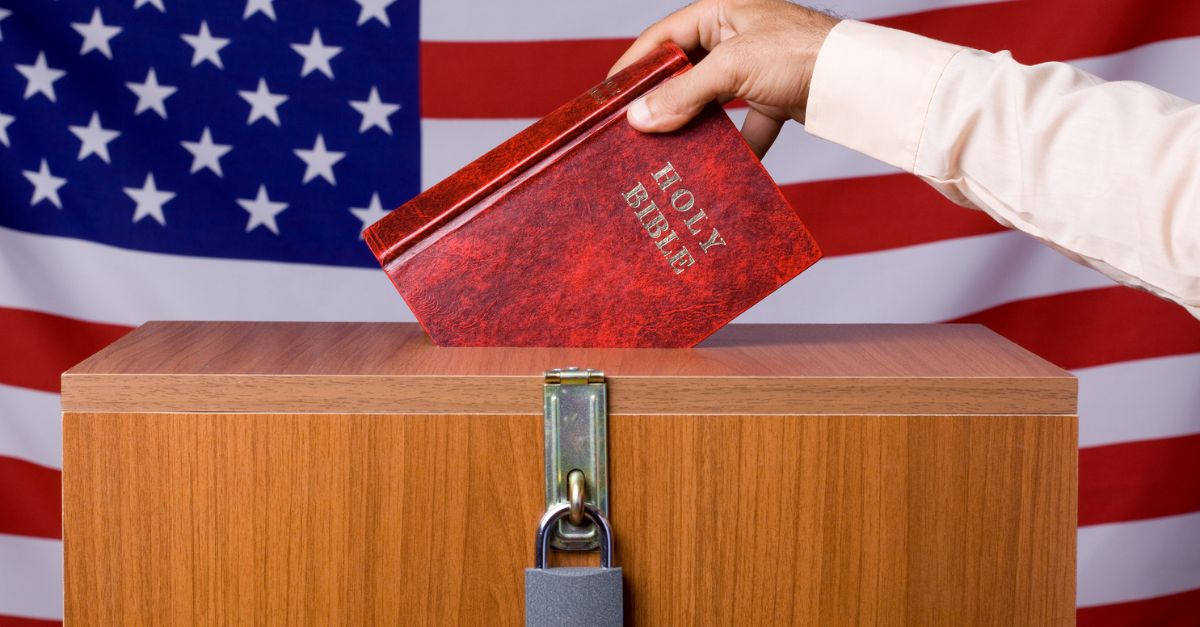2 Mistakes Christian Voters Can Make

Each election cycle, American citizens are readily caught up in hyperbolic language and vitriolic emotions. What’s more, many followers of Christ tend to follow the culture in this regard. What is it exactly about a presidential election that elicits such visceral responses?
The answer is likely more complex than one article can address, but there are at least two possible factors involved. They may not be readily apparent, so let's dig beneath the surface to inspect some root-level issues.
Mistake #1: Misplaced Priorities
While the Bible can be applied to any and every area of life, not all topics get equal representation. Consider the sacrament of baptism. This practice receives not just generic commentary in Scripture (Matthew 3:6; Ephesians 4:5; 1 Peter 3:21), but also explicit commands (Matthew 28:19; Acts 2:38, 10:48).
With the numerous references to baptism in the Bible, one might be tempted to think all Christians would generally agree on how to implement it. But that is not the case. Some denominations hold to infant baptism, while others subscribe to believer’s baptism. This is a serious disagreement on a serious matter.
Even so, mature Christians will acknowledge that, while these differences are important, they are not ultimately matters of orthodoxy. In other words, while Baptists and Presbyterians may not worship together on the Lord’s Day, they don’t typically accuse each other of abandoning Christ through their teaching on baptism. Their differences are not at the critical level of heresy.
In contrast, consider the topic of voting in an election. The Bible never specifically addresses—much less commands—how a Christian should act in a democratic republic. There are, of course, principles that can be drawn out of Scripture for application in the political arena. But there can and should be freedom within the church for different convictions on how to best participate as a citizen of one’s nation. Nevertheless, we see repeated statements in the public square about how a true Christian should vote—as if there was only one obvious and viable option commanded by Scripture.
When believers attach absolute certainty to secondary issues, it creates a moral obligation for all Christians to vote for Candidate X, or to vote against Candidate Y. Treating the issue as an absolute raises it beyond the level of Christian conscience (where it belongs) and up to the level of Scriptural imperative (where it does not). When believers do this, they violate Proverbs 30:6: “Do not add to [God’s] words, or he will rebuke you and prove you a liar.”
We can take the argument a step further: when we elevate our political beliefs to the level of an absolute, we are guilty of idolatry. We have turned politics into a false god—one which motivates our decisions even more than Scripture does. And when politics becomes an idol, our demeanor during an election year will demonstrate our priorities out of alignment: we will treat the outcome of any election as having more significance than it actually does.
Voting is not an absolute, and it is not the foundation on which society stands or falls. The argument could even be made that your workplace, entertainment, household, and church habits throughout each year provide a much weightier “vote” for the society you want than how you vote in a presidential election once every four years.
In any case, the solution to absolutizing politics is not to trivialize them. That is the opposite extreme. Voting in an election is indeed a weighty responsibility. It should be entered into soberly and in the holy fear of God.
Voting should not, however, be held captive to a sinful, anxious fear of any particular candidate or potential outcome. Fear does not align with faith (Joshua 1:9; Psalm 34:4; Isaiah 41:10), nor with love (2 Timothy 1:7; 1 John 4:18). It leads us to view other humans as big, and God as small (Proverbs 29:25; Isaiah 51:12; Luke 12:4-5). When we place too much importance on politics, we place too much importance on our fears being realized—or avoided—in the wake of an election cycle.

Photo Credit: ©Getty Images/selimaksan
Mistake #2: Consequentialism
When captivated by fear, we are susceptible to the temptation of what author Bruce Ashford calls the “single greatest challenge to the Christian ethic”—consequentialism. What is consequentialism? It is, Ashford says, the philosophy that “the moral route is the one that produces the greatest amount of overall good.”
Part of this philosophy’s attraction is that it seems to echo the truth that consequences are important. The wise Christian, after all, considers both cause and effect. For example, Proverbs 27:12 tells us, “The prudent see danger and take refuge, but the simple keep going and pay the penalty.” We want to be prudent, not simple-minded.
But make no mistake, the core tenet of consequentialism is dangerously unbiblical. That tenet says, “What ultimately matters in a given situation is the end result.” Or, put more simply, “The end justifies the means.” As long as we can argue that our actions will bring about the “greatest good,” we give ourselves the ability to justify compromising our convictions. We can excuse questionable means if what really matters is the end result, not glorifying God.
Of course, a Scripturally-informed ethic exposes such a notion as nonsense. What matters ultimately is not the result of our actions (over which we have little to no control), but the integrity of those actions (for which we are responsible). In the grand scheme of history, God rewards faithfulness, not results. If anything, a Christian ethic flips consequentialism’s premise on its head: the means justify the end.
Mordecai is one biblical example of political faithfulness in the face of possible negative, and even catastrophic, consequences. In Esther 3, we learn that King Xerxes honored one of his nobles, Haman, above all others:
All the royal officials at the king’s gate knelt down and paid honor to Haman, for the king had commanded this concerning him. But Mordecai would not kneel down or pay him honor. Then the royal officials at the king’s gate asked Mordecai, “Why do you disobey the king’s command?” Day after day they spoke to him but he refused to comply. (vv. 2-4)
Bible commentators point out that, if a respectful bow is all that is being described here, a command from the king to do what they would normally have done anyway would’ve been superfluous. Whatever the nature of the command, it was extreme enough to violate Mordecai’s conscience. In the words of Matthew Poole, “the worship required was not only civil, but Divine.” And Matthew Henry writes, “The religion of a Jew forbade him to give honours to any mortal man which savoured of idolatry.”
Mordecai does not consider the punishment—on him or his people—reason enough to violate his conscience before God. He chooses the action he sees as right, regardless of the cost. And that cost ends up being the intended genocide of all the Jews in the kingdom. If not for Esther’s intervention, such an ethnic cleansing would have taken place.
Of course, Mordecai could not have foreseen any of that. Like many who had gone before him—Joseph (Genesis 39:9), David (1 Samuel 24:6; 26:9), Daniel (Daniel 6:10) and Shadrach, Meshach, and Abednego (Daniel 3:16-18)—Mordecai simply focused on the means (obedience to God) rather than the end (negative consequences).
To be sure, rejecting consequentialism does not mean rejecting careful attention to possible outcomes. What it does mean is rejecting casting a vote based primarily on preventing outcomes we fear, with little to no thought given to weightier matters, like voting with honesty, integrity, and fortitude.

Photo Credit: ©Getty Images/Royalty-free
Right Priorities and Healthy Fear
We see the solution to the above two mistakes in Isaiah 8. First, in verses 11-13, the prophet says the following:
This is what the Lord says to me with his strong hand upon me, warning me not to follow the way of this people: “Do not call conspiracy everything this people calls a conspiracy; do not fear what they fear, and do not dread it. The Lord Almighty is the one you are to regard as holy, he is the one you are to fear, he is the one you are to dread.”
Now, in the previous chapter, God has acknowledged that a conspiracy was indeed occurring: “Aram has allied itself with Ephraim” (7:2). But here, he is warning them against placing too much importance on the antagonistic human activity against them. They are not to prioritize the conspiracy as the defining factor in their situation, because it makes them functionally forget the most important factor: the Divine activity.
Isaiah tells Judah to replace their fear of human agency (8:12) with the fear of the Lord (v. 13). With their fear properly aimed at the right object (God, rather than man), God’s people will be freed from the temptation to compromise their convictions—i.e., “consult mediums and spiritists” (v. 19). Instead, they can consult God’s instructions (vv. 19, 20), even if those instructions don’t appear on the surface to provide them the deliverance they so desperately crave.
The Best (End) Is Yet to Come
Isaiah’s exhortations are readily applicable today. May we keep them close to our hearts as we seek to honor God in all we say and do: deciding why we vote and who we vote for; prioritizing integrity over outcomes; and rejecting consequentialism (an inherent bad) for a supposed “greatest good.”
The Christian need not be blown about by the storms of political idolatry and fearmongering that ravage our country every election cycle. God won’t settle all his accounts this November, and neither should we. He is playing the long game—and as hard as it may be to believe sometimes, time and history are on his side.
As important as this or any other election may be, its outcome will not thwart God’s plans (Job 42:2). It is ultimately he who establishes and removes leaders (Daniel 2:21; Psalm 75:7). It is ultimately on his shoulders that the world’s governments will rest (Isaiah 9:6; Revelation 11:15). As we follow the means he has prescribed for us in his word, we leave the end of all things to him.
Photo Credit: ©Getty Images/Tetra Images

Originally published October 16, 2024.







